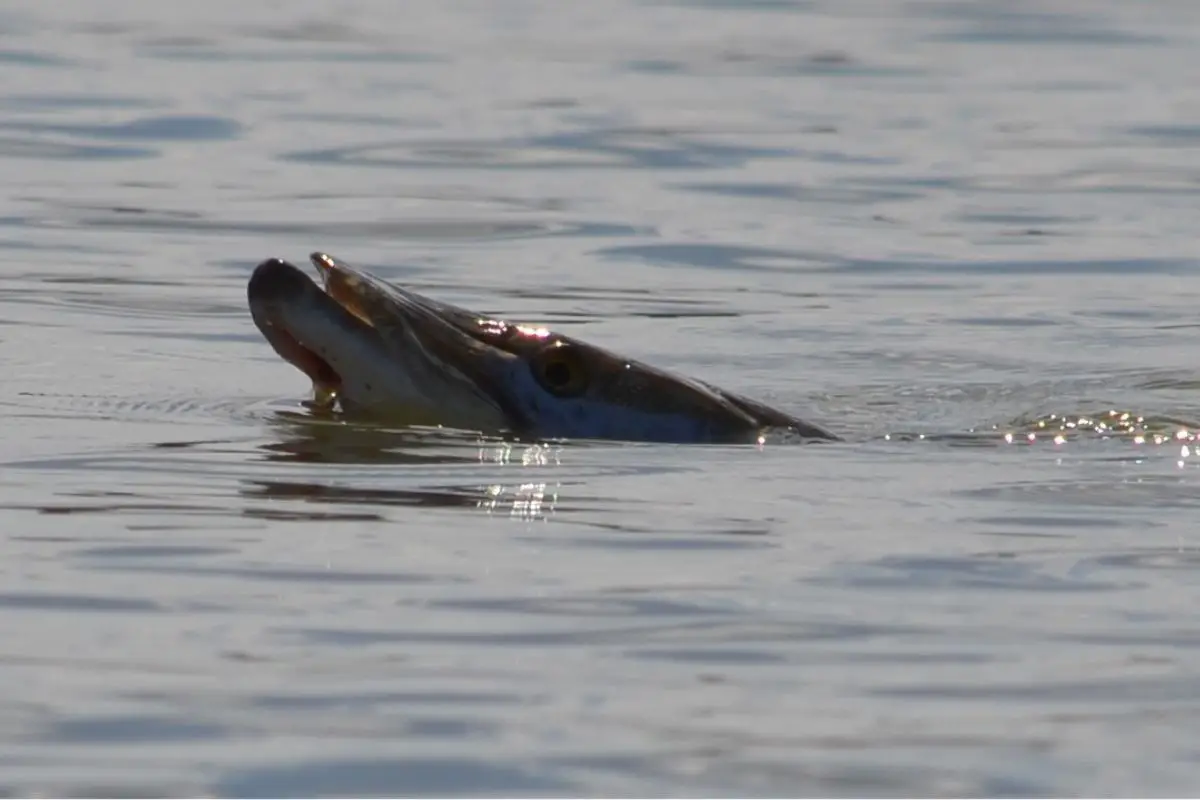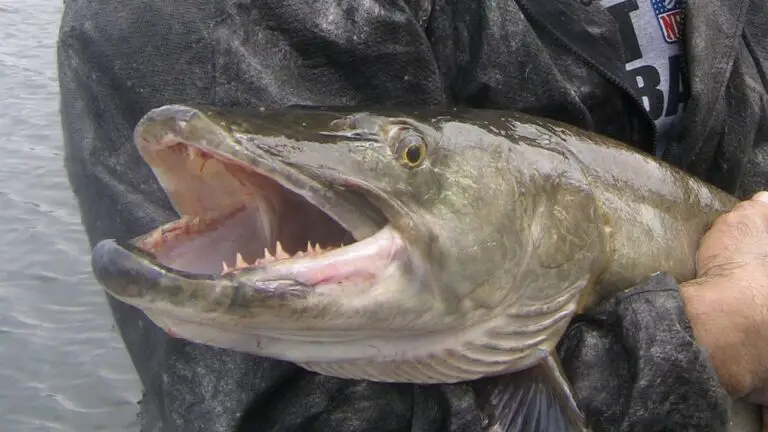Why Do Muskies Swim With Their Head Out of the Water? [Simply Explained]
Musky fish have been known to occasionally swim with their heads out of the water. Many musky anglers have found this behavior to be strange, however, scientists were able to discover the reason behind it.
So, why do muskies swim with their head out of the water? Muskies swim with their head out of the water mainly due to the decrease of oxygen levels in the water. They also do it to clean their gill from debris and to stabilize their bladder so they can swim at deeper depths.
Keep reading to learn more about musky fish and how to catch them when they are close to the surface of the water.
Table of Contents
What You Need to Know About Musky Fish

Musky fish have many different names such as Muskies, Muskellunge, Muskellunge, Muscallonge, Maskinonge, and Milliganong. They’re also known as the fish of 10,000 casts because Muskies can often be very challenging to catch.
There are mainly two types of Musky fish which are Pure Muskies and Tiger Muskies.
The pure muskies are usually light silver, brown, or green. They have dark vertical stripes on the side of their body which might also appear as spots.
The tiger muskies, on the other hand, are a sterile hybrid of northern pike fish and musky fish. They do not grow as large as pure muskies but they usually grow faster. These muskies are usually raised in hatcheries and stocked in many lakes in the United States. You can find my guide to catching tiger muskies here.
What Do Muskies Feed On?
Muskies are apex predators. They have a diverse diet and they tend to eat a lot of different fish species that are large in size.
Their diet mainly consists of yellow perch, suckers, bluegills, golden shiners, walleyes, and smallmouth bass.
Where to Find Muskies?
Muskies change their habitat depending on the time of the year
During the summer, you can find them in deep waters as the temperature gets warm. They will inhabit areas with structures such as weed lines, drop-offs, mid-lake humps, and near rock piles where they will be actively hunting their prey.
During Spring, they will move to shallow waters such as bays, creek mouths, and channels with good weed growth. During this time, they will be preparing to spawn and they will feed less.
I have a complete guide to catching Muskies in the spring here that can definitely help you, so make sure to check it out.
Reasons Why Muskies Swim with Their Head out of The Water

Scientists were able to explain the reasons behind the curious phenomena of muskies swimming with their heads out of the water.
Let’s take a close look at these reasons:
To get more oxygen
If the levels of oxygen in the water decrease, muskies will have no choice but to seek more oxygen above the water surface.
To clean their gills from debris and parasites
When muskies feed at the bottom of the water they might consume some harmful particles such as debris or parasites along with their food and these particles tend to get stuck in their gills. So, muskies will occasionally stick their head out of the water to clear out any stuck particles.
To stabilize their swim bladders so they can swim comfortably at different depths.
When muskies move from deep water to shallow water, their bladders will swell which can be very uncomfortable and cause them to swim with difficulty.
Sticking their heads out of the water often helps muskies force the air out of their bladder through their esophagus to reduce the swelling and stabilize it. This will allow them to swim comfortably at different depths when they re-enter the water.
Will Muskies Bite When They Swim Close to the Surface?
Muskies will bite when they’re close to the surface if you present them with the right lures and baits. However, they will not bite any baits you offer during their spawning season as they will not be interested in feeding at all.
I have made a useful guide to the best Muskie lures you can use here.
How to Catch Muskies When They Swim Close to the Surface?
Muskies can be challenging to catch when they swim close to the surface as they will be much more cautious and wary of anything in the water. They will usually take more time to investigate any lures or baits you present to them before they actually bite.
The best technique for catching muskies close to the surface is by casting large lures. This is usually done while drifting along the areas where they reside. This technique will allow you to cover more water in less time and it’s less likely to scare the muskies away.
Now let’s take a look at what kind of gear is best when fishing for muskies:
It’s best to use long and stiff fishing rods. You can go for an 8 to 9 feet rod with medium to heavy power and fast action. For the reel, it’s recommended to go for a bait-casting reel with a fast gear ratio so that you can retrieve your lure rapidly. These are my favorite baitcasting reels for the money.
When it comes to your mainline, you need a strong line to be able to handle the heavyweight of musky fish. You can go for a braided line with a 50 to 80-pound test. You can find the best braided lines for fishing here.
It’s also a good idea to attach a steel or fluorocarbon leader that’s about a foot long between your mainline and your lure because muskies have razor-sharp teeth that can easily bite through your mainline
Related Questions
When Is the Best Time to Fish for Muskies?
The best time to catch muskies would be around dawn and dusk when the temperature is warm and around mid-afternoon when the temperature is cold. During these times, muskies will be more active and more likely to bite
Do Muskies Jump Out of the Water?
Muskies do jump out of the water for two main reasons. The first reason is to force air out of their swim bladder through their esophagus which reduces its swelling allowing them to swim at different depths when they re-enter the water. The second reason is to clear debris or parasites that are stuck in their gills.
When Do Musky Fish Spawn?
Musky fish usually spawn in the early spring. Their spawning season can last for about a week. During their spawning season, the eggs they lay will adhere to the plants at the bottom of the water. The newly hatched musky fish grow quickly to become about a foot-long by late fall.
Helpful Resources
Hunting Musky with a Fly – A Book by Rick Kustich
How to handle a Tiger Muskie safely
Reliable Rods You Will Love (and Can Afford)
- Fishing for Bass? Check out these very sturdy Bass Fishing Rods
- Ice Fishing? These Ice Fishing Rods Will Never Let your down
- Get the best Trout Fishing Rods here, and the best Catfish rods here
- No rods give you a better value for your money than these Saltwater fishing rods
- Get the best Telescoping fishing rods here, the best Baitcasting rods here, and check out these superb Kayak fishing rods here.
- Fishing the Flow: Expert Picks for the 15 Best River Fishing Rods
If you like this article, please share it or pin it, you can find the share buttons below. We will really appreciate it ❤️








